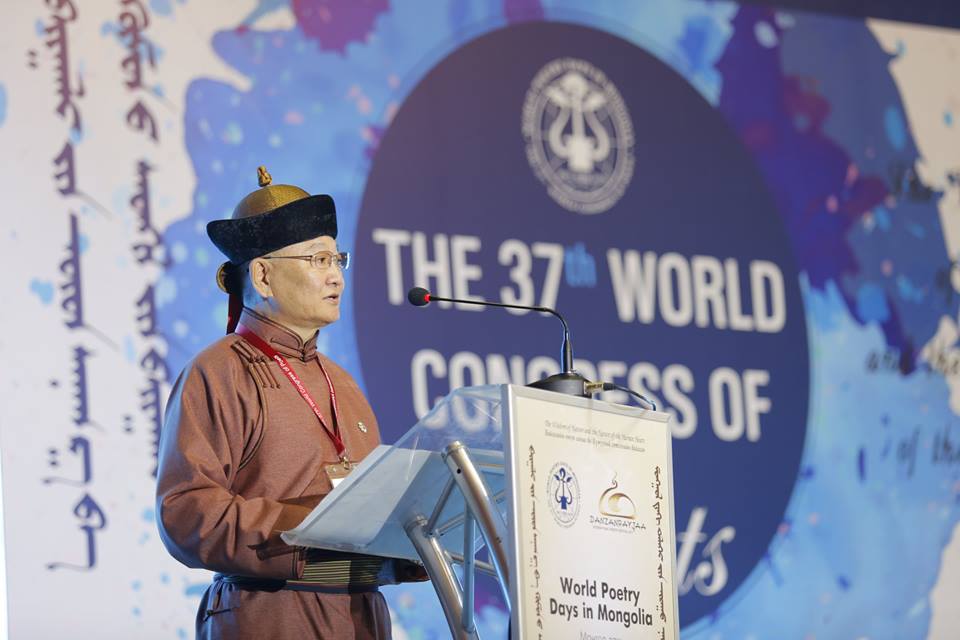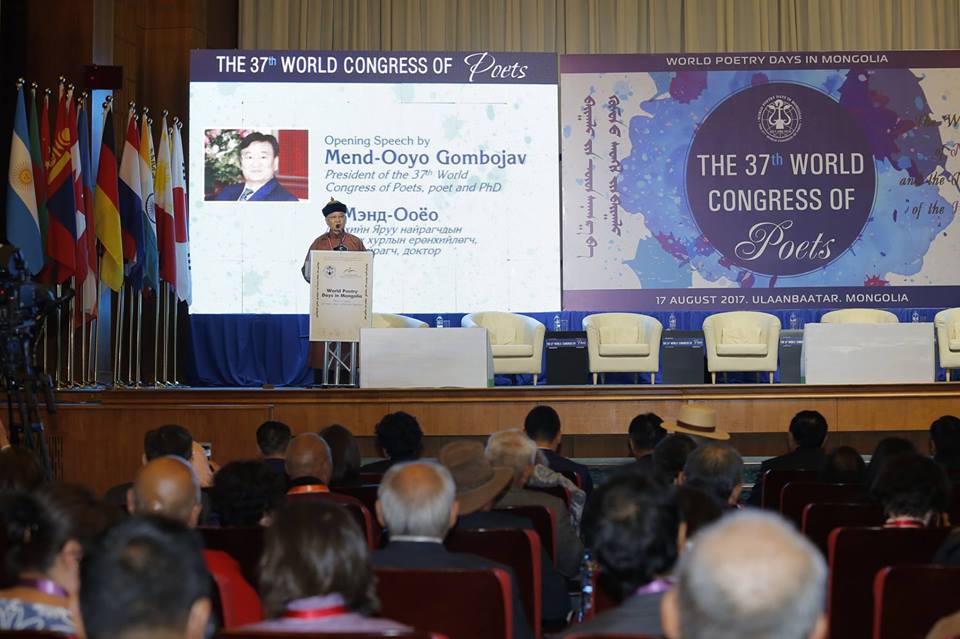POETRY and THE WISDOM OF NATURE
The paper which addressed to the 37th World Congress of Poets in Mongolia, 17 August, 2017 at State Palace of Mongolia.
----
POETRY and THE WISDOM OF NATURE
by G.Mend-Ooyo

Poetry is a powerful and magical jewel which causes the earth’s waves of intuition, wisdom and infinite awareness to shine forth. Throughout human history, the world in which we live is the life-essence of the world, and this world exists in the precious richness of poetry, supported by the people’s oral culture and by the most superior qualities of the mind. Human have used the precious storehouse of poetry without concern for higher or lower or for rich or poor, and the people, their rulers and their lineages, have taken control and exploited the precious storehouse of mineral riches and gold and silver and precious metals. A mind which is miserly, restricted and neurotic about such things cannot exist within the storehouse of poetry, where a generous mind alone can dwell.
Poets!
Today, our human civilization is encountering a great test. The world our mother is losing ever more of her offspring, many of her rivers and her mountain ridges are being polluted and becoming dry, fresh water is growing scarce, and the plants and vegetation and animals are being destroyed, the richness of the earth is being exhausted. Every day we hear about natural disasters such as tornados, earthquakes, landslides and storms, fires and droughts and increased desertification. We have begun to make plans and consider settling other planets, considering how quickly the polar ice-cap is melting, how water levels are rising. The extent to which our life is pervaded by scientific and technological research means that we will grow ever more used to the simplistic fantasy of replacing what we have ourselves been given, we will use up the opportunities we have, and we will quickly lose the ability to see that we are under the control of the computer programs and machines which we ourselves have created. Today in many parts of the world there exists the threat of nuclear war, oppression and slavery, hunger and destitution. The human mind is being overshadowed by the darkness of fear and hatred, greed, the trade in human beings, drug abuse, lies and slanderous words, uncharitable thoughts, and the abandonment of traditions and customs. Love and compassion, which are at the root of human civilization, are being drowned by technology, and are dying out.
In fact, at this time, where are the poets’ voices, where are they needed?
I want to repeat a line from a poem by M.Tsedendorj (1932-1982), one of the most gifted Mongolian poets of the twentieth century:
Poets! How are we to save the world?

The voice of poets, who are the messengers of language and culture, needs to be communicated, for it expresses the heart and mind which beat through the veins of the natural world, pulsating at a single frequency, and it expresses the intuition which is the wisdom of the earth.
The early understanding of Mongolians was that human beings were created from Heaven and Earth, with Heaven as their father and Earth as their mother. In this way, the air and the wind, the clouds and the rain, the hills and mountains, the waters and the springs, the rocks and the stones, and the grasses and the vegetation - all has wisdom through being part of a living system. Pleasure and suffering and happiness and anger and frustration - the mind expresses it all.
Here is one verse from the Vedas of ancient India, written by poets who were among the first of our human civilization:
As the aeons pass, all things perish,
but they remain absorbed into a single quality.
When the new aeon begins,
they are brought about once more by the power of mind.
The living idea in this poem, written five thousand years ago, has not grown old. As the French philosopher and writer Blaise Pascal (1623-1662) said, “Man is thoughtful vegetation.” The twentieth century Mongolian poet O.Dashbalbar (1957-1999) wrote, “My life is in the grasses, withered to white by the wind.” The unity of the wisdom of nature and human beings has been expressed throughout time. And here I want to return to a story which I heard in my childhood.
“When humans were first created, light shone from their bodies, each ate from the fruits of their own trees, and they lived without wanting for anything. One person had a strange idea and, thinking the fruit of another’s tree might taste better, extinguished his own light and stole some fruit. The light did not shine again. With every bad action, the humans’ lights were extinguished. Thus it was that humans ended up without light.”
This story warns us that the mistake of desiring more than the love of our mother the Earth brings us again the danger that we might cover the planet in darkness. Mongolian nomads recite poetry in the form of prayers and praises dedicated to the hills and mountains, and the waters and springs of the land through which they move, they are grateful to the gentle rain, the beautiful rainbows and the vegetation which express love and compassion, they dig up the soil, they feel anger at the destruction of the trees and the plants, and the slaughter of animals, they look with sadness upon the changes in the natural world, the droughts and other natural disasters, and they continue to act carefully and attentively towards their own homeland.
The nineteenth century poet, educator and monk Danzanravjaa (1803-1856), who was born among the nomadic people of the Gobi, was especially adept at revealing the intuitive wisdom of the natural world. His choices of the location for his monasteries and schools were made quite specifically, and in this precise location, which embodied the wisdom of previous aeons in the dinosaur bones and petrified trees, in what remained from when this area had been the ocean bottom, and in the lava which preserved traces of the fires which had swirled through prehistory, Danzanravjaa established his principal monastery at Hamarin Hiid, and blessed this place, which is today called Shambhala, with the great power of enlightened knowledge. The people of the Gobi say that Danzanravjaa rested in the meditative practise of the Kalachakra here, and that he opened the power point in the earth at Shambhala through the power of his meditation, and his students believed that in the future they themselves would come to Shambhala through their own wisdom. One of the scholars who tried to find the land of Shambhala, Nicholas Roerich, wrote that there had been one man who possessed a secret key to it, and it is possible that he was referring to Danzanravjaa. Danzanravjaa himself had written,
The body is not the body.
It is a bright empty rainbow.
Language is not language.
It is a deep melody of enlightenment…
He realized that the wisdom expressed through these words remains preserved in the natural intelligence absorbed into mountains and the waters, in the rocks and the stones, and that the waves of meaning would later flow forth.
In the fall of 1621, Prince Tsogt Taiji, a poet who lived two centuries before Danzanravjaa, went into the mountains to the north of Tsetserleg, where his adjutant, greatly moved by one particular poem, committed it to memory. Three years later, the adjutant Daichin Hia and Güen Baatar had it carved onto one of the so-called “black stones” at Duut. Almost four hundred years later, this music of this poem is still being sounded in the wind and rain. Poetry is absorbed into nature, rocks and stones safeguard the verses through their own melody, and it sounds over hundreds and hundreds of years. What more can be said, except that it is amazing how nature and human wisdom safeguard one another.
At the end of the nineteenth century, the Gobi suffered many years of drought. The poet Gelegbalsan wrote an incantation, “A Request for Rain from the Sky,” and it is said that when many of the local people gathered together to recite the poem, kneeling on white felt at at the source of a dried-up spring, soon clouds gathered in the hazy sky and a rain fell and so ended the drought. The frequency of the words of power which came from the mind of those who recited the poem awoken the awareness which cared for the earth, and we should realize that it was through the desire and movement of many people’s minds that the rain fell. In particular, the melody which is poetry’s rhythm governs the inner vessel, and the words which absorb the excitation of the spirits constitute the power, the waves which magically charge both the natural world and wisdom.
Eight years ago, on a sweltering day in autumn 2009, many poets came together in the city of Uliastai to celebrate the 80th anniversary of the birth of the famous Mongolian poet B.Yavuuhulan (1929-1982) and held a poetry festival in the square in front of the regional theater. When they recited his poem, “I Shall Bring a Downpour,” the poets knew that it had been they who had brought down the rain amid the sunshine.
The epic singers who carry the great heritage of Mongolian poetry sometimes recite an epic by heart, letting it bloom over the course of an entire month. Epic singers are paperless books, herding livestock in their homeland, expressing a rhythm with the landscape, awakening an ancient awareness. In the richness of the minds of these epic singers, story-tellers, poets and writers, these wordsmiths of successive generations is preserved the linguistic heritage of the people, they are loaded up with the breadth of melody, and they shine a timeless wisdom out into the future. The wisdom is expressed in words and formed with music and rhythm, and preserved in the wisdom of the years, and in its awakening shine waves of meaning. The unusual ability to sense the universe’s waves of information is a quality of human nature. Such a sensing is an especially direct path of life experienced by poets, who are predestined to experience it.
When the clear river flows, quite gentle and utterly silent,
the moon shines within it, quietly speaking a lover’s tale.
This antenna which hears the lover’s tale from the moon on the water is the great twentieth century poet and writer D.Natsagdorj (1906-1937). In his poem “The Star,” written when he was twenty years old, he asks the planet Mars, “Is he there or not, who was standing at your feett?” and fifty years later, another great Mongolian poet, D.Nyamsüren (1947-2002) lay on the lonely steppe of Dariganga and, with a poet’s curiosity, listened with one ear to the roots of the grasses, and with the other to the sky:
There’s an insect sitting on the tip of the root,
playing a music which truly I don’t know.
As much as the song is melodious, it is ordinary like the rain and the earth,
the song of trees desiring rain.
But in my other ear,
there’s a strange clarity,
the tune of Mongolian speaking.
I heard this, and
frequently, you heard it.
I hear, beyond the door of the world,
humans talking with the stars...

The feeling of poets that they would make a connection with our relations on other planets has become reality through twenty-first century astronomy. Scholars who investigate earth-like planets on which we might live have begun to whisper together. For humans with great abilities, waiting for signs from space, and studying all the previous scientific information on the world’s environment and phenomenology, there is every possibility that such a planet exists.
At such a time, when the law of the world is that the isolated interior spaces of the minds of human beings are like vessels full of information, from the viewpoint of the poets’ lot, which is to reveal things clearly, further discussion is needed.
As the Persian poet Omar Khayyam (1043-1131) wrote,
Every rosebush which withers
has grown from the ashes of a most beautiful woman.
Every blade of grass, on which I step today,
has come forth from the heart which yesterday was beating.
In the “Song of Myself” in “Leaves of Grass,” by the American poet Walt Whitman (1819-1892), he writes of the grasses, “O I perceive after all so many uttering tongues.” Just as Omar Khayyam in the eleventh century saw how human lives are preserved in the grasses, so Whitman eight centuries later heard the grasses’ “uttering tongues.” And in one of his most famous short poems, Nyamsüren wrote of the shifting relationship between the grass and human beings:
Now, I
am stepping on the grass.
And later, the grass
will grow over me.
It is in listening to the history of the blades of grass, in discovering the loveliness which dwells in the blades of grass, in absorbing the wisdom of the blades of grass and moving into the future that poets find their value. The Bengali poet and Nobel Laureate Rabindranath Tagore (1861-1941) wrote:
Roots are
branches penetrating the earth.
Branches are
roots struggling towards the sky.
If we look with the capacity of the breadth of space, there is no difference between upwards and downwards, between root and branch. In the poet’s inner space, there also exists such a perspective.
Five thousand years ago, it is said, the poetry of the Vedas came from superior wisdom expressed through the human soul. The T’ang dynasty poet Li Bai (701-762), who was said to be connected with Heaven, came to the earth, and when he had finished singing his poetry he returned indeed to Heaven. It is not so amazing that, four centuries before Samuel Taylor Coleridge was born, he had journeyed in his dream to the capital of the Mongol Yuan dynasty and seen the palace of Xanadu, and had then written “Kubla Khan.” When George d’Anthès shot he nineteenth century Russian poet Alexander Pushkin, Pushkin’s heart did not stop, rather it beat in the wisdom of the world. At much the same time, Danzanravjaa did not come to the end of his life through drinking alcohol laced with poison, rather he entered the door of Shambhala, which he himself had opened, and became an Immortal. During the 1920s, the twenty-six year old Japanese poet Kazeko Misuzuki (1903-1929), wrote her final poem about in her wonder at the clarity of the night-time moon, and on the manuscript of this poem which she left to her younger sister, she wrote:
The bee within the flowers,
the flower within the enclosure
the enclosure within the land,
the land within the city,
the city within Japan,
Japan within the world,
the world within the Buddha,
and so, and so the Buddha
is small within the bee…
What can we do, then, to save the world, which exists with all things?
Through the perfect magical power of poetry, let all of us poets shine a brighter light upon the shadowy parts of the human world! Let us listen to the wisdom of nature, and help to bring peace to our planet through opening up the nature of the human mind to others. From my own poem:
The song which the lips repeat
the mountains repeat.
The song which the mountains have repeated
encompasses the world./own poem/
May all songs and all poetry encompass the world.
17th August, 2017
The State Palace of Mongolia
translated from Mongolian by Simon Wickhamsmith


